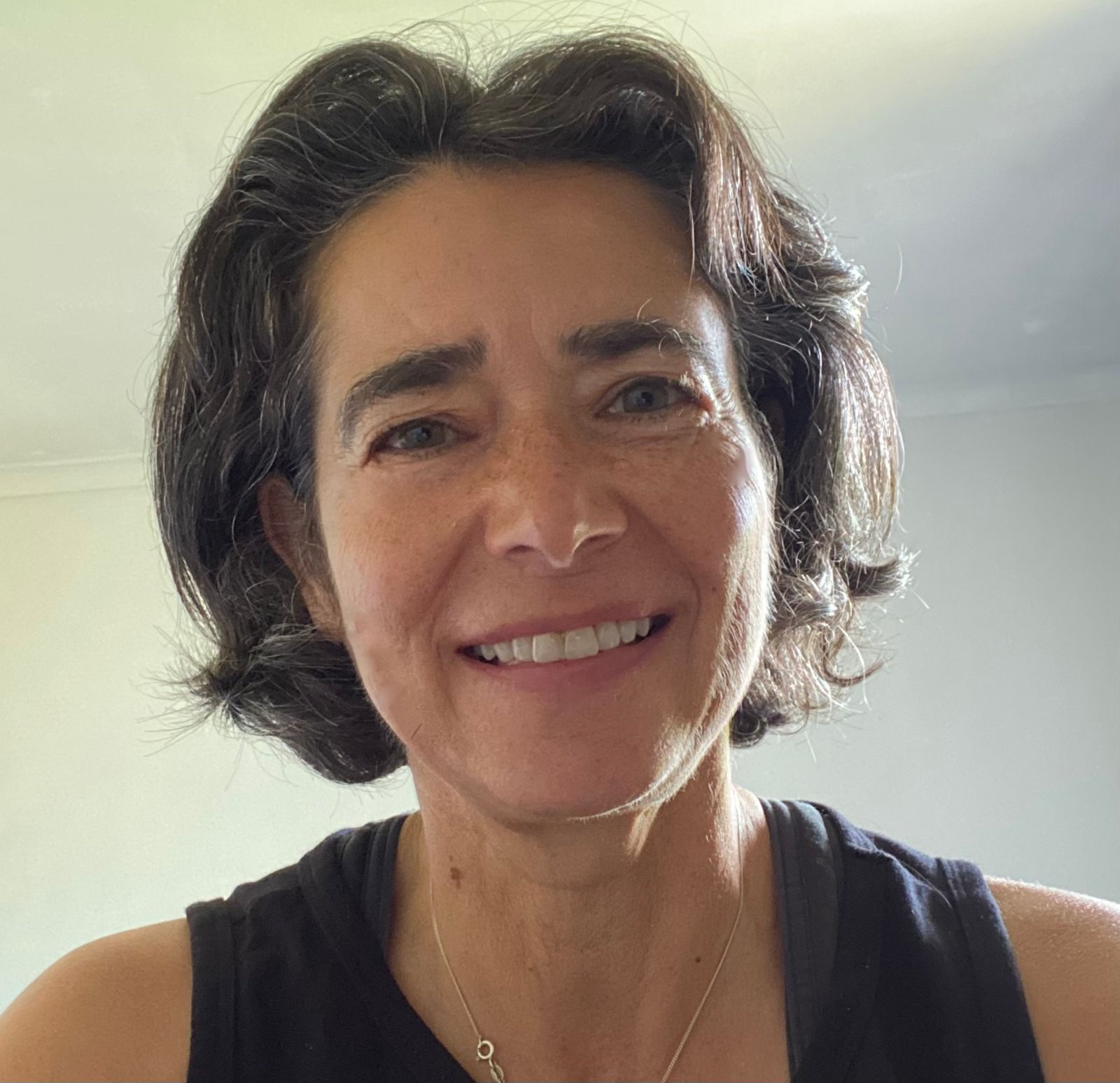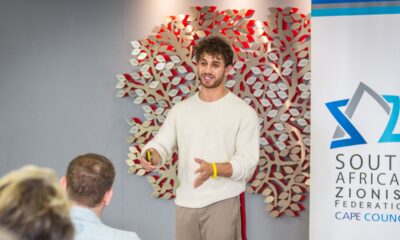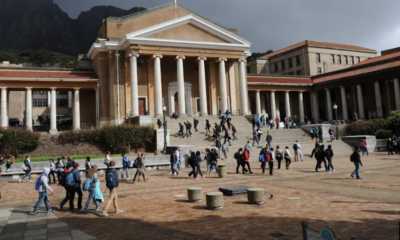
Banner

Local poet silenced for “defending Zionism”
Capetonian and King David Linksfield alumnus Elisa Galgut had always felt welcome in the poetry scene in Cape Town as one of the few Jewish poets in the Mother City. But all that changed when she was recently disinvited from reading her poetry at an event hosted by The Red Wheelbarrow Poetry Collective (RWPC), which calls itself “an inclusive poetry space”.
Galgut, an associate professor at the department of philosophy at the University of Cape Town (UCT), has published a book of poetry and often contributes to poetry journals locally and internationally. About a month ago, friends who are the founders of The RWPC asked her to do a reading at the end of November. She had read for the organisation a few years before.
They asked her to send a sample of her poetry to share her work with those who may want to attend. Galgut sent a short poem about the Holocaust. A few days later, the organisers disinvited her from reading, saying it “wasn’t a good time”. When she pushed them for their reasons, they responded, “It’s because you’re a Zionist,” and said it was “political, not personal”.
After a few local poets expressed dismay at this decision, The RWPC made a statement on 31 October saying, “We reject the recent allegations that a poet was disinvited from our platform based on their Jewish identity. We rescinded an invitation due to an individual’s defence of Zionism. We don’t conflate Judaism with Zionism. The RWPC stands against genocide and discrimination of all kinds, and pledges to continue to maintain a safe and accountable space for poets.”
Galgut has never made any official statements about her political views, but she’s proudly Jewish. When a new volunteer at her poetry group, Off The Wall (OTW), suggested a 7 October event to mark the “genocide in Gaza”, Galgut told her it would be highly inappropriate. Galgut also expressed dissatisfaction with anti-Israel rhetoric and resolutions during a faculty board meeting at UCT. She believes these could be the reasons she was disinvited.
She also thinks it could be because of her poem about the Holocaust, or because she has a yellow ribbon as her background image on Facebook. A few weeks after disinviting her, The RWPC told her it was because of a tweet she wrote five years ago referring to the Jewish people’s history in the land of Israel, and because OTW didn’t hold a “vigil” for the people of Gaza.
“Essentially, they went out of their way to try to find out if I was a Zionist,” says Galgut. “They made the decision to disinvite me, then scrambled for evidence to support it. They say they are inclusive, but they are anything but. Meanwhile, a local poet recently wrote a pro-Hamas poem that wasn’t censured.”
In the poetry space, many individuals and organisations applauded The RWPC. However, Galgut’s own group, OTW, met her and then bravely released a statement in support of her.
“Some in our community will be aware that Elisa Galgut was disinvited from a reading for The RWPC on the basis of political views attributed to her by others,” wrote Julia Smuts Louw, on behalf of OTW volunteers. “As we understand it, The RWPC made no attempt to give Elisa an explanation for its decision or to discuss the views in question. We, the committee of OTW, of which Elisa is a member, think this is an unconscionable way to treat a fellow poet.
“We believe art, expression, and free thought can thrive only in an environment where open dialogue on difficult issues is accepted and, indeed, encouraged, and where people need not fear censure on the basis of their beliefs, actual or perceived. OTW has always striven to create such a space, and we will continue to do so.
“For her part, Elisa has done nothing but serve our small community, including offering her own resources to create a gathering place when our regular venue became unsafe. This is a fraught time in history. As poets and lovers of poetry, part of our role is to cherish nuance and retrieve the personal from the flattening force of political rhetoric. OTW will continue to uphold these values.”
After the SA Jewish Report sent questions to The RWPC, founder Jacques Coetzee wrote to Galgut, saying, “The RWPC would like to extend a sincere apology to you for the way you were invited and then disinvited. We are aware that this decision has hurt you personally and caused distress and confusion in the poetry community. The RWPC recommits itself to creating an inclusive space for all poets, and will consider such matters more carefully in future.”
It was signed by “The Red Wheelbarrow Poetry Collective”, and Galgut notes that this means that no-one took direct responsibility. “I don’t accept it – they didn’t invite me back to read, nor did they apologise for disinviting me, only for the way they disinvited me,” she says.
Responding to the SA Jewish Report, Coetzee says, “The RWPC is privately engaged in seeking a peaceful resolution with all relevant parties. We have recommitted ourselves to maintaining our focus on providing an inclusive platform for poets.”
He refused to answer the SA Jewish Report’s questions, including how it was determined that Galgut “defended Zionism”, and why that was problematic; if Jews in South Africa, most of whom are Zionist, would be barred from reading for The RWPC; how banning people from reading poetry is helpful in bringing peace to the Middle East; and how The RWPC can call itself inclusive in light of this decision.
South African Jewish Board of Deputies National Chairperson Professor Karen Milner recently noted that “deplatforming a Jewish poet by replacing the word ‘Jew’ with ‘Zionist’ because she has failed to meet some ideological purity test – one she didn’t know she was being subjected to – is really just antisemitism in its latest guise.”
Says Rolene Marks, spokesperson for the South African Zionist Federation, “The RWPC has demonstrated a clear lack of understanding regarding both Zionism and Judaism as well as Jewish identity. The vast majority of Jews identify as Zionists, as Zionism is inextricably linked to Judaism.
“Furthermore, making libelous accusations of genocide, which are unequivocally false, reveals the bias and ignorance inherent in The RWPC,” Marks says. “This situation exemplifies an alarming trend in which Jews and Zionists are increasingly marginalised within society, particularly in the literary world. Prominent figures have denounced this practice not only as appalling but also discriminatory, warning that it harkens back to a dark time in history.”











Monty Goldin
November 14, 2024 at 6:33 pm
Re:Elisa Galgut.
Events in South Africa are eerily beginning to look like what befell the
Jews in Nazi Germany
William Buggins
November 18, 2024 at 2:31 pm
This upsurge in antiSemitism is sweeping across the Western world, driven I think by the growth of Islamic communities and Left wing politics in nominally Christian countries. Countries which have turned away from the influence of (true) Christianity and the Hebrew Christian Scriptures.
The religious influence has been replaced by secular humanism and man as simply a biological machine. Add into the mix the fervency of Islam with its hatred of Judaism and Christianity -and everything other faith, and we have a serious problem on our hands.
As a Christian who loves Israel and the Jewish people.
I am very sad that Elisa had such an experience, and I wish her well for the future.
PETROS ISAAKIDIS
January 27, 2025 at 12:05 pm
How denial of the genocide in Gaza is different from the denial of the holocaust? And since when Judaism, Zionism, the state of Israel and it current political leadership are used interchangeably? First time I hear that Judaism and Zionism are inextricably linked!
\\\